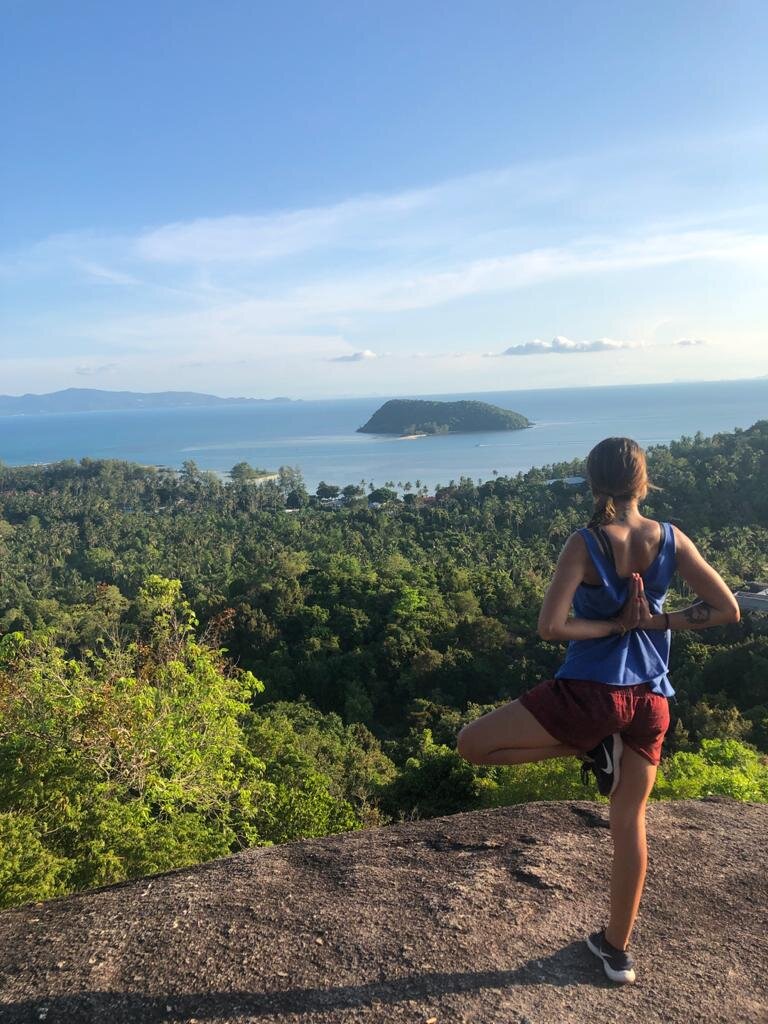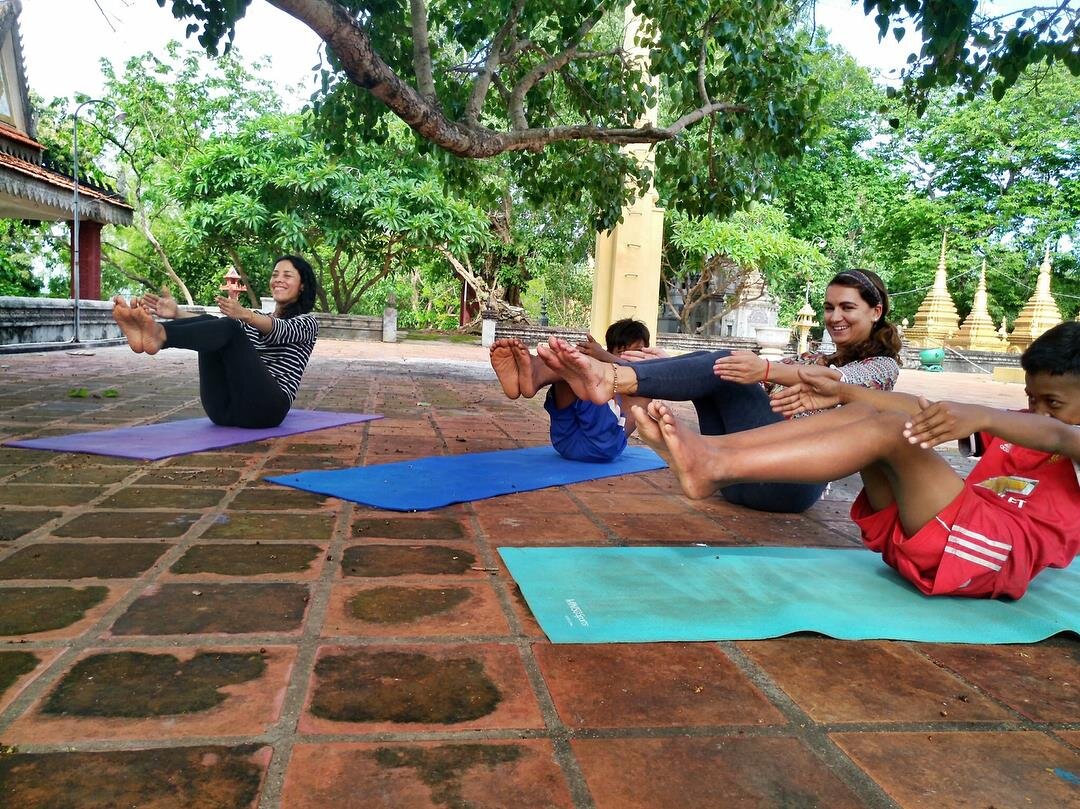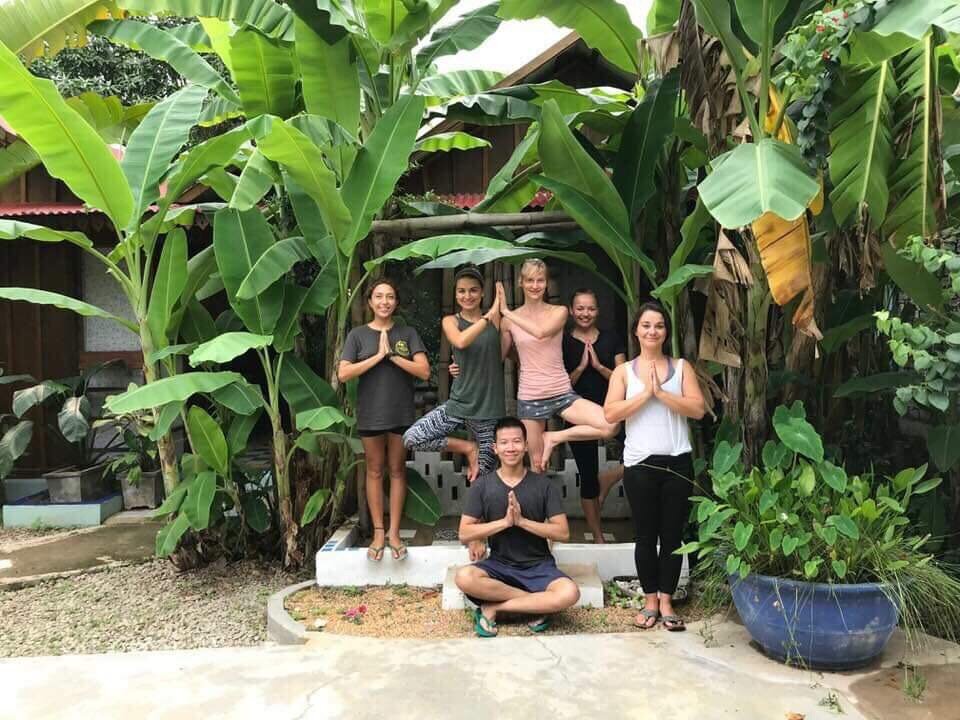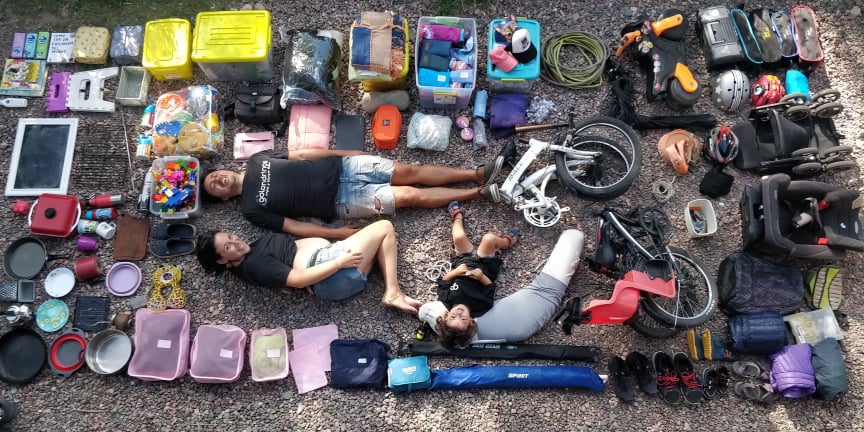
Life As A Traveling Yoga Teacher
Life As A Traveling Yoga Teacher
Living and teaching yoga on a tropical island is a far cry from working a stressful 9-5 office job. While it may seem like an unrealistic dream to many, more and more people are making the transition from a corporate city job to a digital nomad lifestyle.
But is life as a traveling yoga teacher as glamorous and stress-free as it sounds? And is it a sustainable career that can bring you both financial freedom and happiness? As a digital nomad and traveling yoga teacher myself, I know all about the highs and lows this lifestyle can bring.
How I became a traveling yoga teacher
My path to becoming a digital nomad and traveling yoga teacher started back in 2015. I was living in a dingy shared apartment in London and working an office job that I hated. I was deeply unhappy with my life, but two things kept my soul alight – yoga and travel.

Leaving the concrete jungle
Knowing I had to make a drastic change if I wanted to create a better life for myself, I booked a one-way ticket to Melbourne, Australia. I spent the next two years traveling, living, and working down under. While I had the time of my life, I knew that it would eventually come to an end, and the fear of being back in an office for 8 hours a day loomed over me.
During my time in Australia, one thing that stayed consistent was my love of yoga and my practice. I wanted yoga to become a more significant part of my life. I felt the call within to go to Thailand and train to become a yoga teacher on a tropical island. So in March 2018, this is what I did.
Chasing my dreams
After completing my intensive yoga teacher training on the island of Koh Phangan in Thailand, I immediately began teaching at the yoga school. I also taught some yoga classes at a Muay Thai gym on the island. I then secured a one-month placement teaching for accommodation at a yoga retreat center in Siem Reap, Cambodia. As a newly qualified instructor, this was a fantastic opportunity to gain some experience.
A few months later, I returned to the UK and began teaching yoga in studios and gyms. While it was great to build up my experience, it was not the lifestyle I wanted to live. After years of living and traveling overseas, I knew I had to create a lifestyle where I could be free to live wherever I wanted while working remotely.
Becoming a digital nomad
In October 2019, my partner and I (whom I met in Thailand) went back to the country we had fallen in love with. Back on the island of Koh Phangan, Thailand, I began teaching yoga again. However, shortly after, the global pandemic of Covid-19 arrived, and the country, like many others, locked down.
As for many people, during this period, I transitioned to working online. Back in the UK, I had started a yoga blog and created some online yoga videos. However, now I started teaching private online yoga classes and creating yoga content for corporate companies and individuals. At the same time, I began writing articles for travel blogs to share my experience of Thailand and beyond.
Today, I continue to teach yoga through live and recorded video, as well as in-person in Phuket, Thailand, where I live today. I also write for multiple travel blogs sharing my experience and knowledge of life as a traveling yoga teacher and digital nomad.
The pros of being a traveling yoga teacher
Travelling and teaching yoga certainly have many incredible benefits that a city office job simply does not offer. If you’re thinking of becoming a yoga nomad and sharing your knowledge around the world, here are some of the perks you’ll enjoy.
Teaching in stunning locations
I am blessed to have taught yoga classes in some beautiful locations in Thailand. I have held classes under the palm trees of pure-white beaches, in beach shalas facing the crystal clear waters, and my favorite spot – a hill-top bar with an infinity pool and panoramic ocean view. You will find that teaching outside in nature is a whole different experience from teaching in an indoor studio or gym!
More freedom
If you’re teaching at a resort or retreat center, you will probably teach one or two classes a day. This gives you the rest of the day to do whatever you wish. What’s more, you’ll most likely have a day off each week. Therefore, you will have plenty of time to explore your surroundings.
When I was teaching in Siem Reap, I would take trips to explore the majestic temples and stunning waterfalls nearby on my days off. On other days, I would seek out an air-conditioned cafe for an afternoon of good coffee and study in between classes.
Less pressure and more creativity
Everywhere I have taught yoga in Asia, I’ve had complete freedom to teach the way I want (unlike some studios I came across in the UK). Without the pressure to teach in a specific way, I can let my creative juices flow and often feel inspired to try new things in my classes. By doing what you love in such a relaxed environment with zero pressure, you’ll find teaching yoga doesn’t feel like work.
Teaching people from all over the world
Being a traveling yoga teacher has allowed me to meet and share my knowledge and experience with people from most parts of the world. Teaching yoga in tourist destinations and travel hotspots is a great way to meet people you would never encounter when teaching at a studio in your home country.
What’s more, when teaching yoga around the world, you’re not limited to resorts, wellness centers, or yoga schools. For a rich cultural experience, you could look for opportunities to share yoga with the locals in the community. One way to do this is to teach the children at the local school. Many schools in non-English speaking countries now have some level of English language learning. Therefore, offering to teach a yoga class would improve the kids’ English skills and help them relax at the same time.

The cons of teaching yoga on the road
While teaching yoga on a tropical island does sound like a dream job, it’s not all beaches and coconuts. Any lifestyle that involves traveling and living overseas for extended periods has its setbacks. If the idea of being a traveling yoga teacher appeals to you, here’s what you should consider.
You will make less money
If you’re open to traveling anywhere, it won’t be challenging to find a yoga travel job (assuming you are qualified). However, many of these placements are offered on an exchange basis. This means places will provide you with free accommodation and food in exchange for you teaching there. While this is a great way to build up your experience after your teacher training (as I did), it’s certainly not a sustainable way to live.
If you already have some experience under your belt and are staying in one place for a while, you should be able to pick up some paid teaching work. However, bear in mind that you may make considerably less money compared to what you were earning back home if you’re teaching in third-world countries. While it can cover your low living costs there, you’ll struggle to save money for your future travels.
Moving around frequently is exhausting
When you first set out on your travels, it’s fun and exciting. You’re experiencing new things every day and meeting interesting people with inspiring travel stories. However, as most travelers and digital nomads would agree, travel life does eventually become tiring.
It’s not just the physical act of repacking and lugging your backpack from town to town that will wear you out. Continuously traveling can be emotionally exhausting. Just as you have built deep connections somewhere, it’s time to move onto the next place.
You won’t have ‘roots’ anywhere
After moving from place to place for a while, you might start to feel like you don’t have roots anywhere. This is undoubtedly the biggest drawback to nomadic life. To feel a sense of stability in this lifestyle, you might choose to stay in places for more extended periods, so you can at least feel settled for some of the time.
Teaching yoga in-person vs. teaching yoga online
Although I was solely teaching yoga in person when I started out, the Covid-19 pandemic led me to transition into a digital nomad lifestyle. I have found some great additional benefits to teaching yoga online.
You make more money teaching online
As previously mentioned, it’s difficult to make much money as a traveling yoga teacher. However, when you teach online classes or produce video content, you have the potential to make a decent income.
For example, I have some private clients to whom I teach yoga through Zoom every week. As they are based in the UK, I can charge them the standard price for a private class in the UK, which is a lot more than I could charge for an in-person private class in Thailand. I also produce content for UK-based companies, which pay me a UK standard rate.
This is why many digital nomads choose to live this lifestyle. Suppose you are working with European or US-based companies while residing in low-cost countries such as Cambodia or Mexico. In that case, you can enjoy a very comfortable life.
You have more control of your schedule
As a yoga teacher working in a studio or center, you will usually be expected to teach in the morning and evening. However, when you’re teaching private classes online, you have much more control of when you work.
As I teach people based in the UK, I do have to consider the time difference, limiting me to some degree. Even so, I still find more flexibility and control with my schedule, and I am free to dedicate the mornings to my own practice and self-care.
If you’re creating pre-recorded videos or other content, you have even more control of your schedule. You can choose to work whenever you want, another huge advantage of being a digital nomad.
Working online can be more secure
Lockdowns may have forced people to work online, but now more and more people choose to work remotely. As we have seen, working in a brick-and-mortar-only business is not very secure anymore, no matter where you are in the world.
Whether you like it or not, the future is online, and shifting your focus to building an online business or securing remote freelance jobs is a wise decision. I’m indeed glad that I transitioned to working online when I did. Now, whatever happens in the world, I can rest assured that I can always make money.
You have less community involvement teaching yoga online
The only disadvantage I have found to teaching online rather than in person is that you are less involved in the community where you are living. My favorite thing about teaching in-person yoga classes is the community you become part of and create. If you value community and connection like me, you may not want to teach just virtually. Nowadays, most of my work is online. However, I do still run classes in the community from time to time to feel involved in the environment around me and foster my in-person relationships.

Tips on finding work as a traveling yoga teacher
So, do you love the idea of bouncing around from one paradise to another, teaching in different spaces, and immersing yourself in the community around you? If so, here’s what you can do to find your first yoga travel job and get paid to travel.
- Join yoga job groups on Facebook – I have got most of my yoga travel jobs from seeing a job ad in a yoga-related Facebook group. There are some great Facebook groups where people regularly post looking for a yoga teacher all over the world. However, because there are many people in these groups, competition can be pretty high. I’ve found the quicker you respond to a potential employer, the higher your chance. Therefore, I’d recommend turning your notifications on so you are notified whenever someone posts.
- Join location-specific expat Facebook groups – Search for and join expat or digital nomad groups in countries and cities you would like to live and work in. Post in these groups asking if any resorts or yoga studios are hiring.
- Research and contact places directly – Directly contacting centers and studios is another way I have found yoga jobs in the past. Decide on where you would like to travel to, and then research the yoga studios, retreat centers, and resorts in those areas. Create a list of places that you like the look off and then contact each one directly, either via email or through Social Media.
- Update your CV – When contacting prospective employers, always send them an up-to-date CV so that they can see your past yoga teaching experience and qualifications.
- Increase your online presence – It’s no secret that companies check the social media pages of their job applicants. For yoga teachers, we can use our Instagram page as an alternative CV. It is a great visual way to show the world our teaching style. When contacting potential employers, I always send them the links to my social media pages, offering them a way to learn more about me.
Tips on finding work as an online yoga teacher
Perhaps you love the idea of the nomad lifestyle, but you want to manage your work online so that you have complete freedom over where you base yourself. If that’s the case, here are a few tips on creating an online-based business in the yoga world and becoming a digital nomad.
- Get comfortable on camera – Whether you want to teach live online classes or create an online video course, you will need to be comfortable being in front of a camera. There is only one way to do this, and that is to practice. Teaching yoga online is very different from teaching in person, so play around creating some video classes to get familiar and confident with showing up online.
- Start creating video content – If you want to secure online work, you need to put yourself out there and get yourself seen in the online space. Start creating short yoga tutorials or guided meditations and post them to your social media and Youtube channel. Whenever you reach out to a potential student or contractor, send them links to your videos so they can instantly see your style.
- Decide on your niche – Nowadays, the possibilities are endless when it comes to the online world. For example, you can teach virtual corporate yoga classes, one-to-one sessions, create video courses, or create a membership site. Deciding who you want to teach and the format of the content you want to make will help you know where you can focus your attention.
- Look for clients on social media – The type of clients you are looking for will determine how you seek them out. Suppose you want to secure contracts with companies teaching corporate sessions to their staff. In that case, LinkedIn is a worthwhile place to hunt for clients. On the other hand, if you want to find private clients, posting on Facebook and Instagram could help you reach your ideal client.
- Create a website – When creating an online yoga business of any kind, having a website certainly helps. Not only will you look more professional, but a website can also allow you to find clients and can serve as a container for all your content.
- Write yoga articles – Aside from teaching classes and creating video content, you can also make money from writing about yoga-related topics. You can, of course, start your own blog, but bear in mind that it can take a long time to monetize a start-up blog. If you’re interested in sharing your knowledge through words, writing guest posts for other websites is a great way to earn a side income. Be proactive and contact health and wellness websites to see if they are looking for a content writer

Final thoughts
Teaching yoga is one of the best travel jobs in the world. Whether you’re teaching classes to tourists to help them unwind on their vacation, or sharing your experience with the locals, being a traveling yoga teacher is extremely rewarding.
Yoga travel jobs will allow you to pay your living expenses and travel frequently. But if financial freedom is important to you, you may want to combine traveling and teaching with building an online yoga business, becoming a digital yoga nomad.







Hello Gemma, thank you for your beautiful article. It resonate a lot with me as I was teaching yoga in Bali and I am now in Mexico. I would be very interested to know if you have created your company, and maybe you would be able to share a few details. I am very confused about this point. I don’t know where to register and how to handle this. Your experience would be really helpful. Thank you